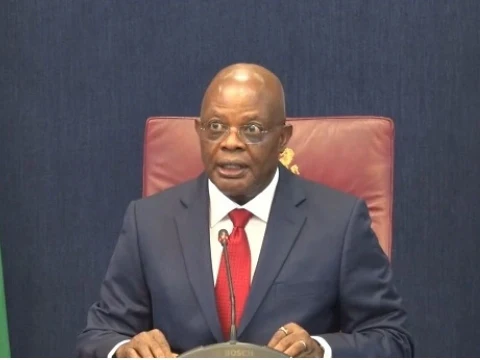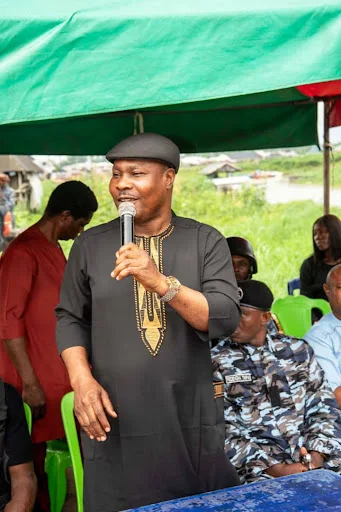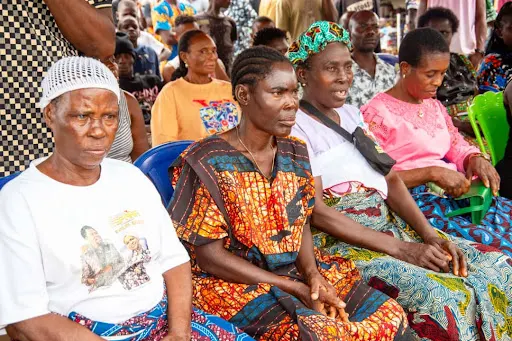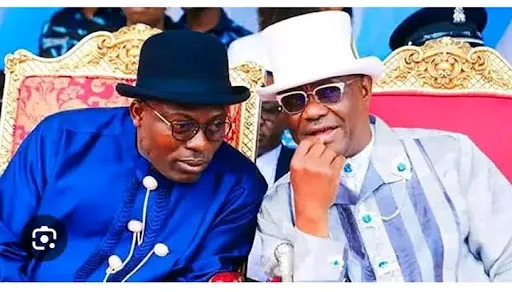The birth of political theories, ideologies and philosophies is always credited to great thinkers. The birth of political theories and philosophies takes different times in every generation and these theories and philosophies are often born like babies at timed seasons in the life of man. A new political philosophy built around Governor Sheriff Oborevwori has been born.It is a political philosophy long propounded by the great philosopher Timiebi. It is called 'Agogoism'. For Timiebi, wherever her husband goes positively, she goes too without demur. Agogoism is an ideology of transformational movement guided by geography and geometry; it is an ideology of total commitment, total sympathy, empathy, humanity and loyalty to accredited codes of interaction and cohabitation. It historically originated from the prompt responsiveness of the husband to the needs of the wife. The philosophy came into being in the 1950s when it was propounded by Timiebi to foreground the sensitivity of man to the needs of women which guarantees marital harmony and success . Timiebi propounded this philosophy to move thoughts of women from the zone of matrilocality to thoughts of patrilocality because patrilocality is a solid bridge to marital harmony and success , and it makes the woman gravitate towards any progressive path charted by the man in a marital union.
In contemporary time this philosophy of Agogoism has been subjected to a strategic transplant, grafting, retooling, in the hands of Deltans. For Deltans Governor Oborevwori has demonstrated such moving infrastructural and educational commitment they are prepared to go to wherever the governor goes. Piloted by this philosophy, Deltans only applauded Oborevwori in the wake of his strategic movement to APC because it is an ideological movement envisioned to position Delta State advantageously at the national level of politics.
Every Deltan terms the governor's strategic movement a centripetal shift rather than a centrifugal shift that compromises and endangers the ethos and ideals of togetherness at the ethnic, cultural, economic, social, political and national level of cohabitation and meaningful integration.
The philosophy of Agogoism is now home to renewed vigour, relevance and meaning having being built around the single-minded developmental firmness of Governor Oborevwori who sees infrastructural and educational development as his lifeblood, communicative tools and tentacles of connection to progressive forces and institutions in politics . Because the governor inhales and exhales development in every dimension of life in politics, Deltans are unanimous in their resolve that they must tread on any path befriended by the governor. Now that he is in APC, they are also in APC. Because they know the governor needs eight years to consolidate and accomplish his development plans for Delta State, they have signalled their support for the governor with the rebuilt and transplanted contemporary version of the philosophy called 'Agogoism' which means Deltans must go wherever the governor of Delta State goes.
At the ward level the political philosophy of Agogoism has gained meaningful traction. On 28 June 2025 at ward seven in Burutu Local Government Area of Delta State , the people of ward seven (Ngbilebiri one) headquartered in Ayakoromo, indicated that they are also firm carriers of the Agogoism ideology as they gathered and communicated to the world that President Bola Ahmed Tinubu and Governor Oborevwori should be re-elected in 2027 based on their politics of performance and development vision. Towards this progressive direction, Hon. Asupa Peter Forteta whose anatomical and physiological composition carries the Agogoism philosophy, and who does everything to project the philosophy for consolidation of the RE-ELECTION dream of Governor Oborevwori, he financially supported the ward seven gathering with a huge sum of money even with the knowledge that he is not from ward seven, only carrying roots buried in ward nine (Ogbolubiri). Asupa's inspiring supportive financial presence at ward seven on 28 June 2025 in Ayakoromo where it was unanimously declared Governor Oborevwori and President Tinubu should have a turbulence-free sail in 2027, marks his principled avowal to form alliance with any move to actualise the RE-ELECTION projections of Governor Oborevwori and President Tinubu.
How Hon. Asupa became a pragmatic boost for the philosophy of Agogoism at ward seven shows his ambitious support for Oborevwori's and Tinubu's continuity jingle. It shows Agogoism and Oborevwori have merged just as Asupa has become part of ward seven's identification with the philosophy of Agogoism in Delta State and beyond.
In Agogoism one can find the support of Deltans for Governor Oborevwori's movement to APC; in Agogoism one can also find the support of Deltans for Oborevwori's RE-ELECTION madrigal.
Agogoism has become the envisioned enabler for Oborevwori's journey to Government House in 2027. Ward seven and Asupa have become the vehicle for the transportation of Oborevwori and Tinubu to the projected 2027 without fogged visibility encumbrances
Governor Oborevwori and Agogoism are now on identical path.The two appear to have consolidated a twosome alliance. He believes in investing in any venture potentially beneficial to Deltans. His movement to APC is driven by his unconscious immersion in the philosophy of Agogoism because he naturally holds the conviction that it will benefit Deltans at all levels of governance - both state and federal.The movement is developmentally driven because it is underlain by an ideology of unimpeded growth projections for Delta State.
Alliance anywhere is always an applauded strategic political movement. An alliance with Tinubu is clearly an alliance with forces of growth and transformation in governance. Agogoism is also reflected at the infrastructural and educational levels of Oborevwori's pragmatic developmental ideation for Deltans. For Oborevwori he is prepared to journey across any sea bound to activate the infrastructural flow of Delta State much as he daily walks on paths envisioned to move Delta State educationally to the peak in the aspect of bursary and scholarship awards for financially inhibited students of Delta State origin. For the governor of Delta State there is a meaningful gravitation towards infrastructural Agogoism and educational Agogoism, as audaciously captured in his developmental vision for Deltans - a developmental vision demarcated by roads, bridges, cloverleaf, flyovers and drainages marked clearly as either ongoing or completed.
It amazes people that the philosophy first propounded by Timiebi Maika to communicate marital harmony and growth was first hijacked by Deltans without acknowledgement. Today the Agogoism principle has been positively 'hijacked' by Governor Oborevwori who has become an expanded version of Agogoism. However the developmental expansions Governor Oborevwori has brought upon the Timiebi-made philosophy of marital harmony, the governor should recognise that it was Timiebi Maika who first propounded the philosophy of Agogoism.
Viewed from the perspective that the philosophy of Agogoism is historically credited to Timiebi Maika, Asupa who recently popularised the Agogoism philosophy at Ayakoromo through his pragmatic support of ward seven's firm stand for the re-election of President Tinubu and Governor Oborevwori in 2027, must realise that Timiebi Maika deserves a recognition for philosophically clearing the path for Agogoism now turned into a collective political jingle for the people to come together and democratically empower Tinubu and Oborevwori for the 2027 race.
From a brook in the mangrove thicket near Grangbene Deep 'A' Project located between Oyangbene and Labulouseigha, where I am seated on a dugout canoe for a reconnaissance mission around the creeks, I can see Rt. Hon Julius Pondi waving at me his handkerchief of political Agogoism strategically linked to Tinubu, Oborevwori and Asupa. A posthumous congratulations to Timiebi Maika for philosophically making it possible for Deltans, Tinubu, Oborevwori, Asupa Forteta and Julius Pondi to walk on the golden path of political Agogoism without pressures being strategically mounted on them! Timiebi Maika must be a great philosopher of political togetherness who deserves a posthumous recognition from Governor Oborevwori and President Tinubu for her philosophical truism and commitment now that her propounded 'Agogoism' philosophy has become the muster point for all political thinkers of worth.
Ekanpou writes from Akparemogbene, Delta State.

















